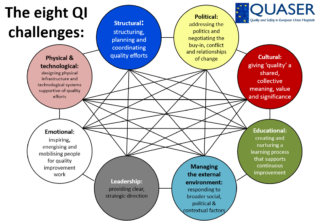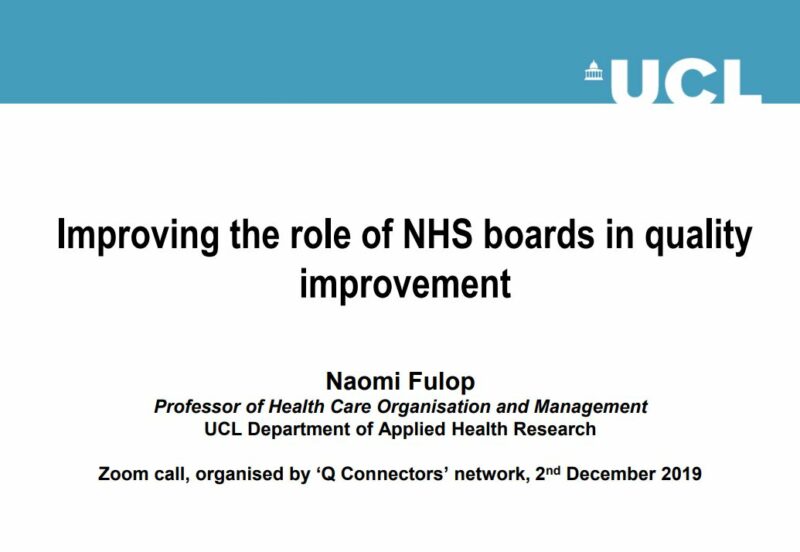In this webinar, Professor Naomi Fulop shared her insights about how some Boards and senior leaders have moved from focusing on Quality Assurance and finance to enabling Quality Improvement.
Watch the webinar
More information and resources from the webinar
Naomi led the Quality and Safety in European Hospitals (QUASER) programme, which identified a relationship between Trust performance and QI maturity. It also produced a guide for boards to develop organisation-wide QI strategies, and developed an 8-dimension Board QI maturity framework. It found that mature boards use data to drive improvements rather than merely for external assurance, and also combine hard data on performance with soft data on personal experiences to make the case for improvement.
 Strong clinical representation having an active role on the board is one of the necessary conditions for a board-level QI intervention to have positive effect. Also, allowing challenges from independent voices well versed in QI, helps ensure that it isn’t a ‘staged board’ with a focus on display and little challenge or debate, and decisions already made by the executive. There is a key role for ‘boundary spanners’ linking ‘the board to the ward’ and making connections between data silos.
Strong clinical representation having an active role on the board is one of the necessary conditions for a board-level QI intervention to have positive effect. Also, allowing challenges from independent voices well versed in QI, helps ensure that it isn’t a ‘staged board’ with a focus on display and little challenge or debate, and decisions already made by the executive. There is a key role for ‘boundary spanners’ linking ‘the board to the ward’ and making connections between data silos.
It’s also vital to allow for ‘slack’ in the system – ‘thinking space’ and capacity for action – to enable organisational improvement transformations to occur. This is exactly what is missing in the underperforming organisations that are under pressure to improve, but faced with additional reporting burden. It additionally identified the growing role for service users in guiding improvement.
Naomi’s article ‘How do hospital boards govern for quality improvement? A mixed methods study of 15 organisations in England’ (BMJ Quality & Safety) further found that high maturity boards balanced short-term (external) priorities with long-term (internal) investment in QI.
This section of the page is for Q members only. If you are already a member please log in, and if not, find out more about joining Q.
This Zoom call was organised by the Q Connectors network.
Naomi Fulop’s bio
Naomi Fulop is Professor of Health Care Organisation & Management at University College London, Visiting Professor at King’s College London, and an NIHR Senior Investigator.
Naomi trained in social sciences at the Universities of Bristol and London, and in public health at Harvard on a Fulbright scholarship. She is an internationally renowned health services researcher with expertise in applying organisational and social perspectives, using qualitative and mixed methods, to understand change and improvement in health care, both at different levels of the system, as well as locally, nationally, and internationally.
Naomi led a major research programme funded by the EU on quality and safety improvement in European Union hospitals, and leads two large-scale studies, funded by the National Institute of Health Research (NIHR), of major system change: one on acute stroke services in London and Greater Manchester; the other on the reorganisation of cancer surgery across London Cancer and Manchester Cancer. Naomi is also co-director of a rapid evaluation team funded by NIHR for five years to study service innovations in the NHS and social care.
Naomi was until recently the elected Chair of the Health Services Research UK (2013-19), a national network bringing together those who produce and use health services research to improve policy and practice. She is also the UCL nominated Non-Executive Director on the board of Whittington Health NHS Trust.
